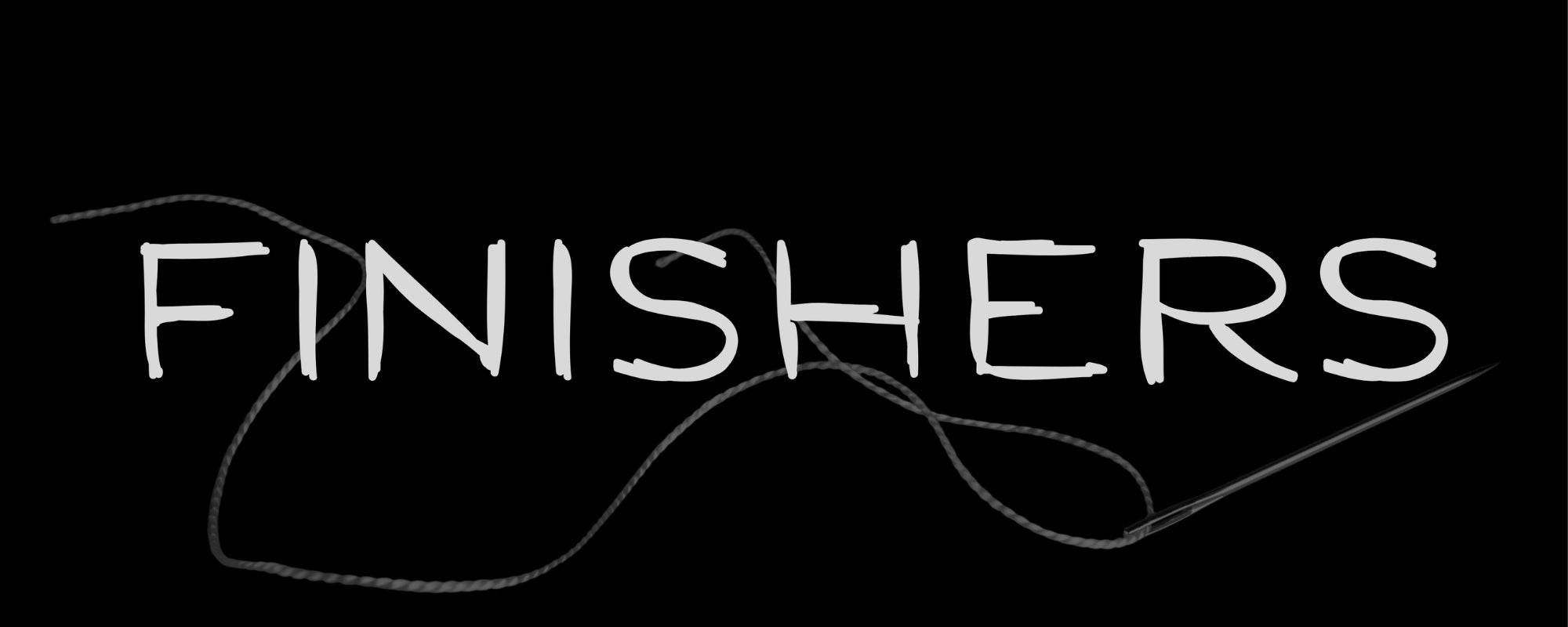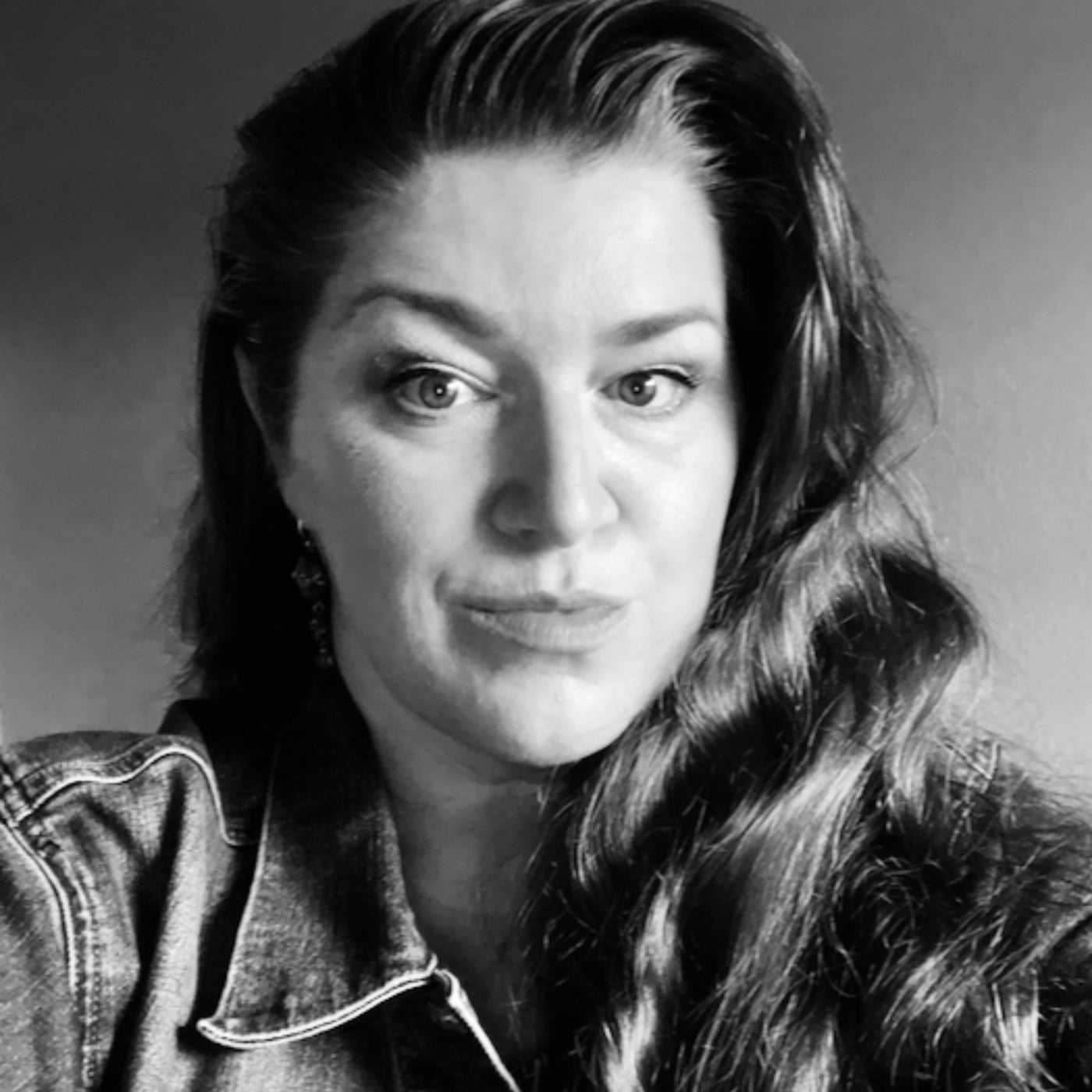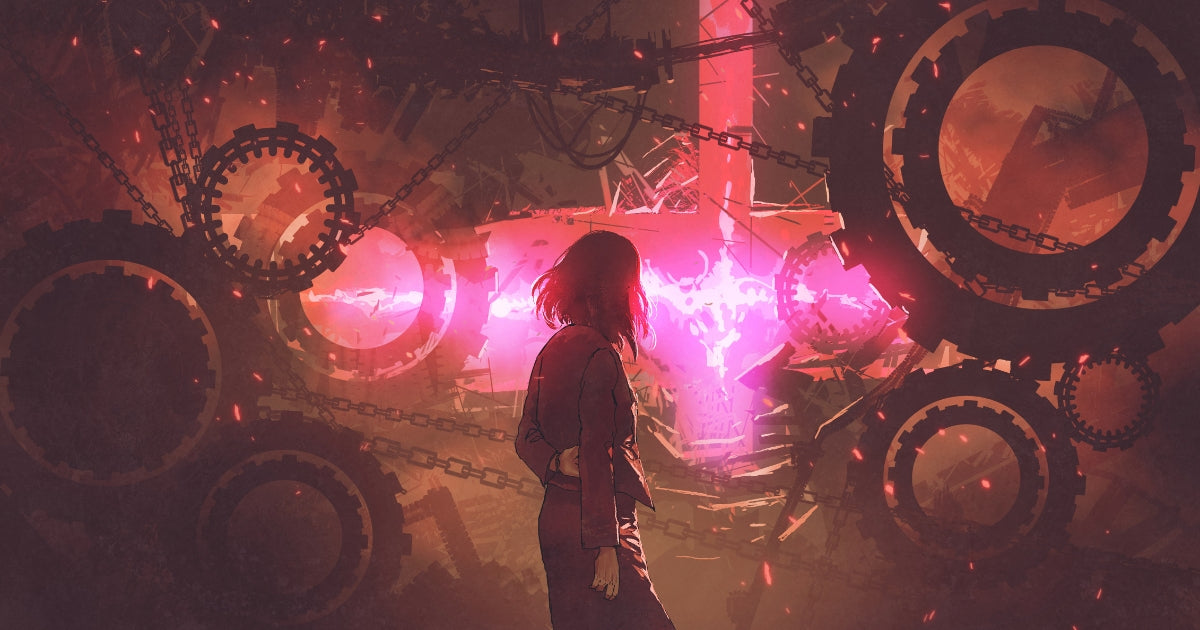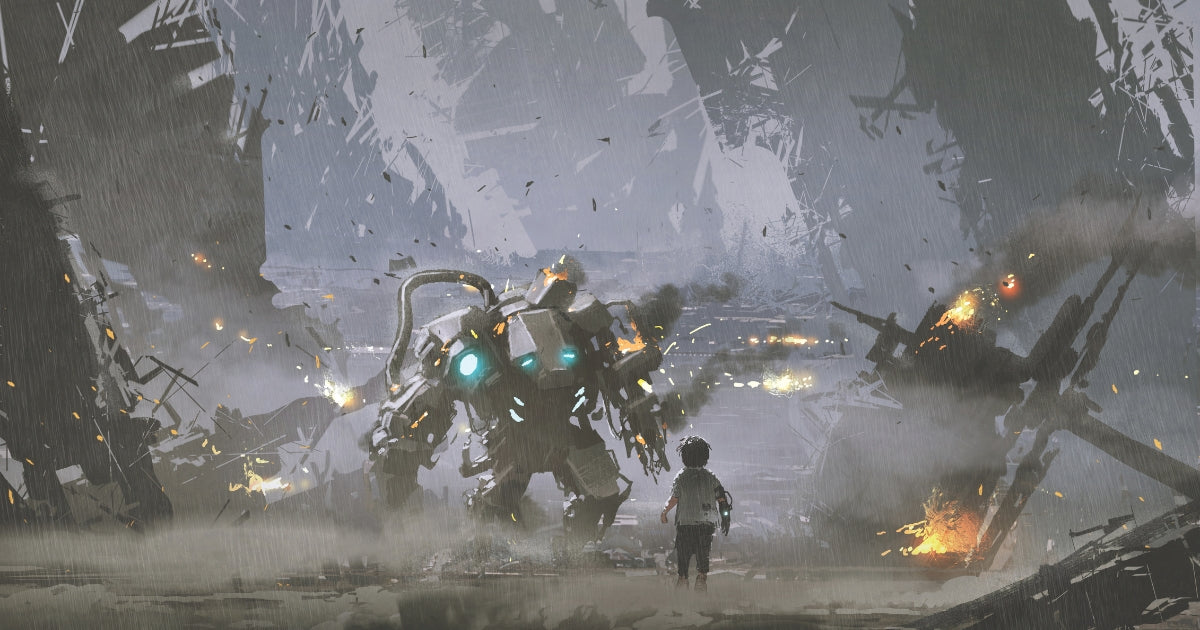

Finishers
By Christi Nogle
Audio Narration by Michaela Meyers
I’m always a little excited and nervous when Mother unwraps a new package. Sometimes, under the wooden lid is a folder stuffed with photographs—perhaps a storage disk with video references as well. If so, Mother’s body seems to grow heavier on the instant; her shoulders slump down. It will be a challenge to get everything right. She will labor and worry for weeks, and even so, the robot will most likely keep coming back to us for adjustments.
Sometimes there is no folder, but the body under the foam peanuts and plastic is a chill russet pink instead of the standard green-gray. This indicates extra mechanisms in the pelvis. There will be extra steps in the molding process of its “bottom,” and I won’t be allowed to watch some of her work. Mother looks on this kind with distaste. I am glad they don’t come very often.
The best is a greenish body and no folder. This is Mother's opportunity to practice her art. And I’ll get to help!
She’ll turn on the robot right there in the foyer. We’ll walk it back to our quarters, spend the evening with it, get to know what idiosyncrasies it already has. Mother says this is what any sculptor does—look at the stone, look at the wood, and see what form or character is suggested there.
Most bodies are the same. They’re between 5' 8" and 6' 2", all of them broad-looking to me. Mother calls the most common type the Mesomorph. There is a softer, rounder sort called the Grande, and a wiry one called the Straw. There was one, once, as small as Mother, and another one broader than our bedroom door—another with massive, bowed thighs. All of these are rare, though. Most are the standard Mesomorph.
To sit and have dinner with a new, greenish Mesomorph—one with no folder—is a rare treat. It doesn’t yet speak, but soon we stop calling it, it. We call it he or she or they, as we like. The robot becomes a person to us.
“Did you see how she leans just a little to the right?” I say.
“Oh yes,” says Mother.
“And her waist is a little wide, isn’t it?” I say. It isn’t—she has just a standard Mesomorph form—but the way she sits suggests self-consciousness of a waist that is a little bit wide.
“Her legs are long and beautiful, though,” Mother says. I love how her face brightens when we get one like this. It’s the only time she looks the way she did when I was little.
The first step is brutal. If Mother wants an extra few centimeters of leg, arm, or torso, the body will need to go into the stretcher. Every other alteration to the standard form can be accomplished with the suction molds—but not this one. I am allowed to watch, but I am too cowardly to sit though the process. Today, I decide I must attend class, but I ask Mother to please call me before she does anything more than the legs.
She waves me away. Her face is grim again.
I used to love going to class. It’s not actually going somewhere, I know that—especially these days—but it feels, or used to feel, like a trip.
I go into our bedroom, take off my clothes, and put on my bodysuit. I step onto the platform with its school desk and treadmill. I turn on the bodysuit and pull its hood over my head
It used to be different. Back when I was small, my robot body would open its eyes, I would push open the door of its robot cabinet and walk into the halls of a real school somewhere in the Midwest. I would walk alongside the other children and teachers in the hall.
It wasn’t perfect, the navigation. There was always a delay when I made a turn. I would have to turn my robot body and pause its movement, then move my actual body so that I could keep walking forward on the treadmill. I had to be aware of where I was in both spaces at all times, or I was a mess.
Once I was at my desk, though? Oh, it was heaven. Some of the children were there in body, and some were there as I was, but I couldn’t tell the difference. I raised my hand over and over, and my wonderful teacher called on me. He loved me.
He is the same teacher I have now, but not the same. His slender body is the same. His loud purple shirt, his smile. But he is not the same.
The children there in body could always tell who was a commuter (or who wasn’t real, in their words). They cornered me on the playground one day early in my first year, all wanting to touch me to see what I felt like. I was afraid at first—I hadn’t touched anything in the school except for my own desk and chair—but it felt wonderful to have all of their hands on me. It felt like touches on a foot that’s fallen asleep.
Sensations are soft and strange in the robot body. When it’s windy, you don’t feel the wind the way Mother said you once could, back when you could go outside. You don’t feel it in every root of hair, but you can feel the wind.
I went into the school bathroom once, and a girl said, “Why are you in here? You don’t need to be in here.” I had come in wanting to look in the mirror, of course. I knew I wouldn’t see myself in my reflection. Still, I was surprised to see the tall child with her black curls and her wide, violet eyes staring back at me—surprised and delighted. I didn’t like to think of what would happen when noon came and this pretty face closed its eyes only to open them moments later when another child in some other part of the world logged in for afternoon classes.
Now it’s all different. There is no bathroom, because no one in the whole school is there in body—not the teachers, not the students. We’re told it’s not safe for them to travel there. The air is too bad now.
The school isn’t even there in body anymore, come to think of it.
My teacher looks like the teacher I used to love, the one who used to love me for my enthusiasm. But I have no enthusiasm, and he is not the same person.
I never raise my hand. I pretend to sit at a desk. I pretend to listen until he lets us go, and I log off. There is a socialization period after class that isn’t strictly optional, but I do not want to meet anyone this way. I don’t like the way it feels when they touch my shoulder now. I can’t abide the dead looks on their faces.
***
The new robot has a name: Eleanor. By the time I get down to the basement, she already has her long, beautiful legs. I lay out a skein of silky, light brown hair and a deep-olive spray for her skin, but we’re not quite there yet.
Mother chooses an unusual nose form—long and wavy with flared nostrils. She attaches the plastic mold to the suction tube, presses it to Eleanor’s face, and turns it on.
There’s a deep chugging, glugging sound, then the gasp of release, and now, instant character.
We laugh at how much the nose changes things. We agree now that the eyes will be wide-set, hazel, with long, arched brows. The upper lip will have a curl; the lower lip will be medium-full. I set out all of the molds for the face and choose a small, youthful breast mold.
“This okay?” I ask.
“Perfect,” says Mother.
“Why do robots have nipples, anyway?” I say.
She chuckles but doesn’t look away from her tools; doesn’t respond. I have asked this before.
Everything except the face and breasts, Mother will freehand with a suction blade and a rounded buffer. She’s planning for a narrow backside to go with the wide waist.
You’d think because Eleanor is green, we wouldn’t need to think about fine bodily details, but that isn’t so. Eleanor might want to wear a bikini sometime. Mother has to give her backside some texture, but just a bit. We don’t want to detract from those masterpiece legs. We have to decide what her abdomen looks like—wide, yes, but firm or a little bit slack? Will she have a prominent collarbone? Will her ribs show at the top of her chest?
By bedtime, it’s all decided. I can see Eleanor clearly in my mind and know that Mother sees her even more clearly. I bet that when I get up in the morning, she’ll have already put away the molds and all the suction tubing, and Eleanor might already stand all olive-brown and ready for her finishing touches.
***
When I was ten or twelve and Mother and I were arguing, I told her, “I used to think I might be a robot, you know. I cut myself to see the blood; to make sure that I was real.”
I wanted her to feel sorry about that. Instead, she laughed into her glass of whiskey.
“Is it funny?” I said.
“You think when they cut themselves, they don’t see blood?” she said.
That struck me. They must, I realized. They must have a filter running in their minds somehow, so they always see what they are supposed to see.
***
“Your attendance is improving,” my teacher says. We’re all alone, having a conference in the virtual classroom.
“Yes, and all by my own choice,” I say. My arms are folded, legs kicked out into the space between us.
“You don’t like school very much, do you Mary?” he says.
“I’d rather work,” I say.
He looks through a folder on his desk. “That’s right,” he says, “You’re an apprentice…hairsetter? Is that right?”
“I’d say I’m a master hairsetter by now. I’m an apprentice at full finishing.”
“Full finishing?”
“Everything—sculpture to hair to voice, customs, even portraits.”
He doesn’t chuckle, but he looks down. “Everything. Well, that’s sweet. I didn’t know there were any workshops like that around anymore.”
“Our workshop is underground,” I say. With a port into the foyer that we’ve never known how to open. The company that brings us the raw forms also brings us our paints, food, and liquor. One day soon they might decide that such artisan work is not worth the cost anymore, and then they might drag us screaming from our burrow—would they?—or seal us up inside. This is a fear I might have once shared with my teacher, but not now.
“That’s very sweet. Quaint,” he says.
“But?” I say.
“But,” he says. “Well, you already know what I’m going to say, don’t you?”
And of course I do. He is going to say that I need to make something more reasonable of myself, study something modern, join a company, and perhaps live as company people do in a smaller, bleaker hole than the one I’m in now.
But there would be community, shared goals. Maybe a chance for love.
It breaks my heart how much this teacher looks like the teacher I loved. I remember one time, how he walked us out through the playground gate—just the ones of us who were there remotely because it would have been too great a risk for the others. He showed us some of the town outside the school. He pointed to all of the wrong around us and explained why it was so. He told us we might be the ones to make it right again.
I remember the terrible things I saw, but I remember, too, the blue and aqua and pink of the sky. I remember touching trees with my sleep-tingling hands.
This teacher now, he just wants me to have a mind for something that will keep me from becoming obsolete before my time. That’s a nice sentiment, but it’s not enough.
***
Eleanor already has rosy lips, an oily T-zone, a thick tumble of tawny hair, but no hairline. I miss class and spend the day and night rooting each hair around her temples and forehead, then each eyebrow hair, each eyelash. I want to do the hair on her arms, but Mother says it’s too late. I have to go to bed; I have to go to class. She says I must sleep, and that when I wake up, Eleanor will be all finished.
I think of all the places Eleanor still has to go—because she is a special one, made to move through the world on her own. She will need much education and much testing, and then she will go off to do some job in the world. Somewhere outside. I fall asleep trying to imagine it, but cannot picture much besides the wide, bright sky.
***
Eleanor is gone. It was deadline, and we didn’t get to do all we wanted with her voice. It was low and husky like we’d wanted, but not quite right somehow. We consoled ourselves by talking about how someone else might decide on an entirely different voice for her, and how we could not control everything. We dressed her in a white satin slip and boxers, and walked her to the foyer.
“I guess this is goodbye?” Eleanor said. She crossed her arms loosely, as though she felt chilled. We shut her into the foyer without a word. We cleaned up the workroom, ate, and slept.
Now we wake. We eat again, loll around for half an hour. By the time we return to the foyer, a new box is waiting.
“Let’s start in the morning,” Mother says.
“Don’t you think…” I say.
She’s already nodding. “We ought to at least open it,” she says. She takes her pry tool out of her pocket.
“We should at least look,” I say.
“So we can dream on it,” she says.
“Of course.”
She lifts the lid, and we both let out a sigh. A folder. A pink cast to the flesh beneath the plastic.
“How old are you now, Mary?” she says.
She knows my age; she must. I don’t say anything.
“Time for the birds and the bees.”
We have dinner with the folder, not the robot. He is still in his box, still under his plastic.
Thankfully, there is no drive with videos. He is a custom, but not a portrait, you see. He is a new individual, like Eleanor, so we won’t have to use the same precision as we would with a portrait.
He is a Mesomorph like Eleanor, like most of them. His colors and his dimensions are spelled out. Mother points to one particular detail and explains how we’ll open the cabinet of molds that has always been closed to me, and how the telescoping bulb in his pelvis will make his new part raise and lower, swell and deflate after it’s molded. I giggle the entire time because, of course, I already know all of this. Still, it will be kind of cool to see.
The robot is only a him because the folder said so. All of the pink ones have the same shuddering mechanisms inside.
***
“Do you want to keep doing this forever?” Mother says.
“Yes, of course,” I say—and mean it. I’m sprawled on the floor, half under his leg. I’m rooting the hairs of his inner thigh and still have the chest and everything else to do. The folder specified all of it. I’ve never had such a boon of hair work before. Mother says she still isn’t sure whether she’ll let me, but I’m planning to root the hairs of his thatch, and treasure trail, and butthole, all of which are supposed to be lushly furred. I have not thought about going to class at all.
“Have you ever thought of going out, seeing something of the world?” she says.
I did once, long ago.
Nothing Mother ever said, nothing from my teacher, nothing ever suggested that I would be able to step outside the foyer door, and so I stopped thinking of it, and now I won’t let my thinking go that way again.
“No, of course not,” I say.
I notice Mother has a glass of something clear.
“Is that water?” I say. “Can I have some?”
“It’s not water,” she says. Her face is cold and angry.
“Maybe we ought to go to bed,” I say.
“I’ve been thinking what a shit life this is,” she says.
“I’m sleepy,” I say, and I pull myself out from under the robot’s heavy leg.
“And how just about anything else would be better for you,” she says.
***
“I know you are here,” my teacher says. “I would not be seeing you if you weren’t logged in. You know that, right?”
This is not a conference; this is class, and the other students are all looking on. His expression is cold and angry.
“Say something!” he says, and then there is some sort of glitch. His body slackens and a second later, he bounces back to the lectern saying, “Now let’s get on with this lesson.”
“Oh, wow,” a boy beside me whispers.
“What?” I say.
“They took him out. It’s another teacher now.”
“It’s not. It’s autopilot,” says another student.
I don’t care. I have just the hood of my bodysuit on. My hands aren’t in it at all; they’re rooting the hairs in the backs of the robot’s thighs. We won’t make the deadline otherwise, and the feel of it is addictive.
Mother is sleeping. She’ll be angry that I’m doing this, but relieved when we meet the deadline.
If we don’t do what we need to do, maybe orders won’t come. Maybe groceries won’t come. Maybe the foyer door will never open again.
***
Mother and I fight. We make up. We fight again on a deeper and more satisfying level. I fold up the bodysuit and place it in the back of the closet for good.
***
The hairy robot is gone. He stood politely in his satin boxers until someone opened the foyer door. He said hello in his soft, deep voice. After they looked him over, they probably gave him some clothes and shoes to wear. They led him out, brought in another box, and closed the door.
This new box is twice as broad as a normal one. A folder lies inside.
Mother is already thinking about how we will cut this one’s belly open. She’s thought of this even before it arrived; she’s been waiting for one like this.
She’s thought of how we will take out great masses of filler foam and make a place where I can curl up with my knife. I will get one chance to see the world.
Like a waking dream, an image of my old teacher crosses my mind. He speaks of the Trojan Horse and all the other adventures of Odysseus.
While Mother and I work, we speak of what will happen. What will I see out there? Will I be caught and brought back here? Or might I even flee back here, finding the world too hot or cold or poisoned? If I come back, will Mother still be here?
But her face stays hopeful throughout the questioning. The doom and disgust do not cross her face again, so I cannot go back on this promise.
“If you return and I am still here, how will you know it’s really me? What if they swap me out?” she says.
I’ve thought of this. I’m brought back screaming, brought back in a wooden box, weak and drugged and chastened, but glad to be home—only it isn’t home. The mother I loved is someone else, or not a person at all.
But I say none of this. Instead, I laugh and say, “Oh, I’ll know you from the liquor on your breath.”
She laughs, takes another drink.
But what if they seal up the port? What if they starve her inside?
I can’t go. I know I can’t. It’s just something for us to fantasize about, isn’t it? Yet we have removed the foam filling and hidden it in a corner cabinet, deep behind the pots and pans. We have sculpted a place inside the body, just as though we really are doing this. I have practiced curling there and practiced the shallow, shallow breathing. Like meditation, like going someplace else.
“Aren’t they watching us work? Aren’t they watching us all the time?” I say.
Mother shrugs. She doesn’t know.
Once the space inside is ready for me, we begin the sculpting, the coloring, the crinkled copper hair. We have stopped talking of the future. We do the finish work more lovingly than ever before, but we’re sure to stay on track for the deadline.
Copyright © 2021 Christi Nogle
The Author

Christi Nogle
Continue reading

Subscribe to our newsletter
Promotions, new products, and sales. Directly to your inbox.



